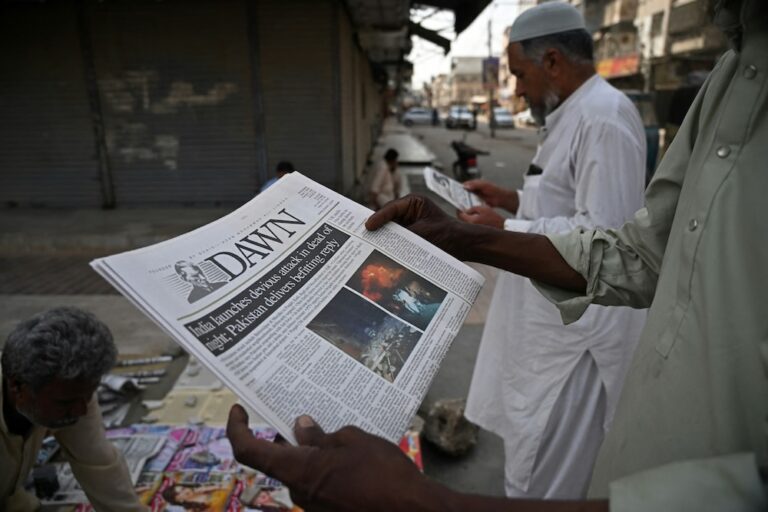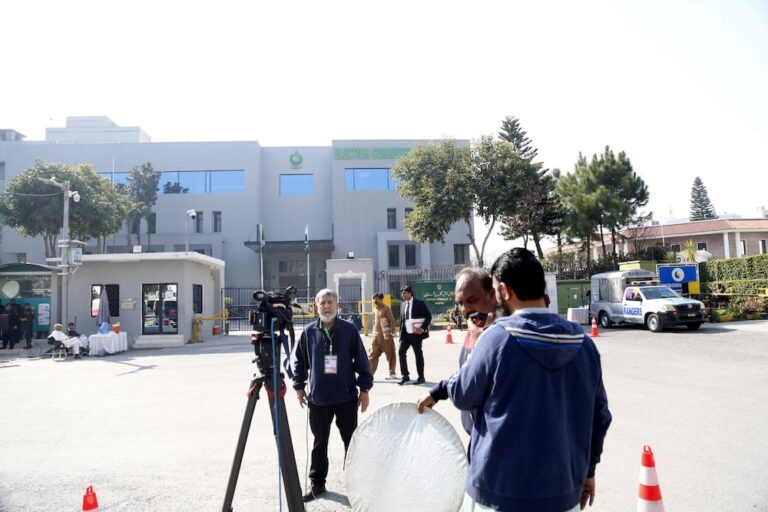(IFJ/IFEX) – The following is an abridged version of a 3 April 2009 IFJ media release: IFJ Calls for Top-Level Inquiry into Murder of Journalist in Pakistan The International Federation of Journalists (IFJ) joins the Pakistan Federal Union of Journalists (PFUJ) in calling on Pakistan’s Government to set up a high-level judicial commission, headed by […]
(IFJ/IFEX) – The following is an abridged version of a 3 April 2009 IFJ media release:
IFJ Calls for Top-Level Inquiry into Murder of Journalist in Pakistan
The International Federation of Journalists (IFJ) joins the Pakistan Federal Union of Journalists (PFUJ) in calling on Pakistan’s Government to set up a high-level judicial commission, headed by a superior court judge, to investigate the murder of journalist Musa Khankhel and ensure his killers are brought to justice.
The call by the PFUJ, an IFJ affiliate, is made in the interim report of a PFUJ team which recently visited Pakistan’s troubled Swat valley to investigate the murder of Khankhel, after local authorities failed to initiate their own inquiry.
“The IFJ is deeply disturbed by the PFUJ’s findings, and the alarming failure of police to investigate the brutal murder of Musa Khankhel,” IFJ Asia-Pacific Director Jacqueline Park said.
“Pakistan’s federal and provincial governments must pay heed to the findings and recommendations of the PFUJ inquiry and order an immediate investigation at the highest level to ensure Khankhel’s killers are brought to account.”
The bullet-riddled body of Khankhel, a reporter for The News International daily and GEO News channel, was found in the Matta sub-division of Swat several hours after he was reported missing on February 18. He was the fourth journalist to be killed in Swat since 2007.
At the time, Swat was a strong focus of attention due to a controversial ceasefire agreed between the federal and provincial governments and local militant groups, and Khankhel had gone to Matta to report on public events addressed by cleric Maulana Sufi Mohammad.
The PFUJ reports that a five-member police team headed by a high-ranking official did not begin its investigation into the murder until February 27, the day the PFUJ team visited the valley in North-West Frontier Province (NWFP). No official police investigation report has been filed and police did not cooperate with the PFUJ inquiry.
The PFUJ found that Khankhel had told several colleagues and friends of receiving threats in the weeks before his murder. It is believed these threats may have come from both the local Taliban and Pakistan’s intelligence agencies.
Hamid Mir, a well-known GEO anchorman who was in Swat on February 18, wrote in The News on February 21 that Khankhel was especially worried about security agencies.
The PFUJ found that Khankhel’s reporting had equally enraged warring sides in Swat. He had a “rough temperament” and took uncompromising positions, earning the enmity of many, but he was considered a brave reporter.
On the day he was murdered, the Government’s Inter-Services Public Relations (ISPR) Media Centre prevented Khankhel and his brother Essa Khan, a journalist with The Nation, from attending a NWFP provincial minister’s press conference dealing with the ceasefire. Both journalists were accused of being “pro-Taliban”.
Khankhel’s family and friends confirmed that Khankhel had a “good relationship” with the local Taliban. He had traveled to Matta with members of the outlawed militant group Tehreek-e-Nafaz-e-Shariat-e-Mohammadi, or the Movement for the Enforcement of Islamic Law.
“He drove in the car of Sufi Mohammad to Matta, where he attended their public meeting . . . he was present on their stage,” ARY One reporter Shahzad Alam told the PFUJ.
Both the security agencies and the local Taliban deny involvement in the murder.
The chief of Aaj TV’s bureau in Swat, Fiyyaz Zafar, who also was a member of the PFUJ team, said, “One cannot directly point the finger at a person, intelligence operators or a political gang, because Mr Khankhel has never accused anybody for his perceived murder. He was brave and blunt. During his short stint as a TV reporter, he had made many opponents owing to his uncompromising attitude. He would often talk about his exploitation as a hard worker.”
The PFUJ concluded that Khankhel’s killers could have been caught had the security forces acted quickly after the journalist was first reported missing. However, the area in which Khankhel’s body was recovered was not cordoned off at the time and no search operation was conducted.
The PFUJ added that some electronic media personnel probably made a tactical error to protest the murder by leaving the area for three days soon after Khankhel’s burial. The PFUJ said the presence of journalists was necessary to ensure law enforcement agencies acted.
For the full text of this release, see: http://asiapacific.ifj.org/en/articles/ifj-calls-for-top-level-inquiry-into-murder-of-journalist-in-pakistan
The IFJ represents over 600,000 journalists in 122 countries.
Updates the Khankhel case: http://ifex.org/en/content/view/full/100898


